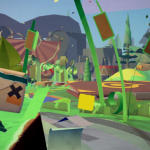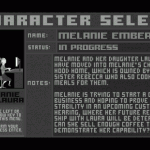When Games Matter is a weekly exploration by Drew Dixon of meaningful moments in games. Operating under the assumption that games do in fact matter, Drew seeks to highlight those moments that have much to say to say about who we are and the world we live in.
Tom Bissel recently wrote an interesting review of sorts of Elder Scrolls V: Skyrim in which he spent the latter half of the article criticizing the game’s poorly conceived dialogue and overly abundant lore:
Dense expositional lore has no place in video-game stories — especially stories that go without highly wrought cinematics — and it seems increasingly clear that video games are neither dramatically effective nor emotionally interesting when the player’s role becomes that of a dialogue sponge. . . .
Why make every character a walking lore dump when lore can be more effectively embodied in the world and environments? After all, the world and environments are already there in Skyrim; they’re quite literally everywhere you look, gushing all manner of wonderfully implied lore. And they’re beautiful. Like most who play Skyrim, I’m greatly drawn to these incredible environments because the act of exploring them becomes uniquely my experience.
Bissel is one of my favorite game critics and his book, Extra Lives: Why Video Games Matter, helped inspire me to take up writing this column but I don’t think I could have had a more divergent experience with the lore of Skyrim. What Bissel feels detracts from an otherwise compelling world, I feel enlivens it.
Skyrim is my first true Elder Scrolls experience. I played about 10 hours of Oblivion which pales in comparison to the many people who spent 200+ hours playing it. I have found myself willingly reading Skyrim‘s many books and stopping to listen to the stories of it’s many characters. I am not, as Bissel suggests, a lore-fan. I skipped nearly all of the lore of Dragon Age: Origins and stopped midway through my second reading of The Lord of the Rings trilogy due to feeling overencumbered by it’s lore.
For the first time ever, I decided to make a female character–I did this for a very distinct purpose–to make clear in my mind that I am not my character. I don’t live in Skyrim, I can’t cast magic spells, and I am not a dark elf. As I explored Skyrim, I came across many books about the Dunmer or “dark elves,” my character’s people. I discovered that many were forced out of their homeland of Morrowind, many are now exiles or slaves, and that most Nords (the native people of Skyrim) hate the Dunmer. I read about their wars, their bitter history, their heroes, their villians, their religion, their culture, and their checkered past. I was also fascinated by many of the stories of my kindred or “lore dumps” as Bissel calls them. When I arrived in Windhelm and found out that all the dark elves were living in poverty in the slums. I was eager to hear their stories–rather than oppressing me, their stories enriched the story of my own character–this expositional lore became “uniquely my experience.”
I understand many of Bissel’s complaints. There have certainly been times that I found Skyrim’s dialogue annoying. I often wanted to tell the guards in Whiterun, “Give it a rest! NO ONE STOLE MY SWEET ROLL!” However, given how videogames tend toward power fantasies, I found the history and lore present in Skyrim refreshing, it reminded me that the world around me is much bigger than my character.
Were it not for the dense lore of Skyrim, I would not have known much if anything about my character’s people and I don’t think I would have cared as much about her if I hadn’t. Further, all this lore is optional–most of it you can pass on, but quite often, I find myself not wanting to. I also find myself constantly stopping to listen to the conversations of others–many are awkward but each tells me something about the city I am in. These are details that Bethseda did not have to include and details that I could pretty easily ignore but the multitude of them serves to do something rather rare in video games–it makes the game more about the world than it is about me.
Skyrim’s history, culture, and lore certainly are embodied in its world but why can’t games embody lore in dialogue as well? Despite the fact that I am able to slay dragons and shoot fireballs from my hands, as I climb Skyrim’s peaks, explore its ruins and listen to the stories of its inhabitants, I can’t shake the how small it makes me feel.











